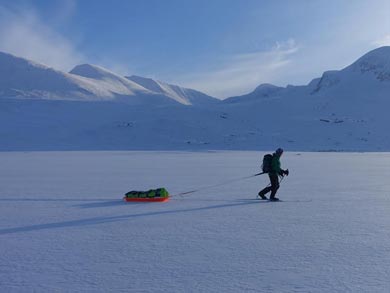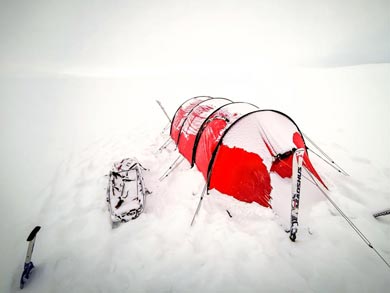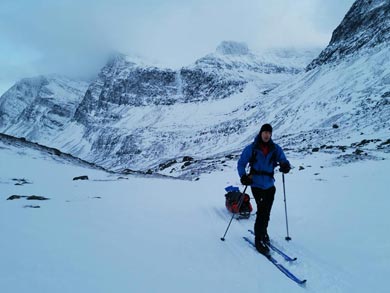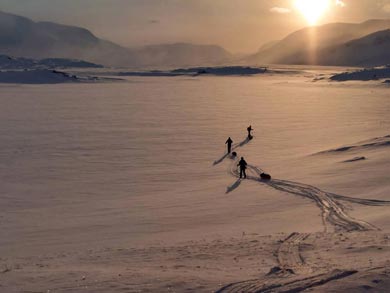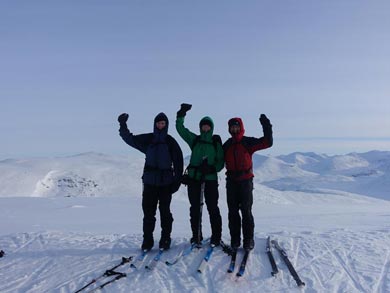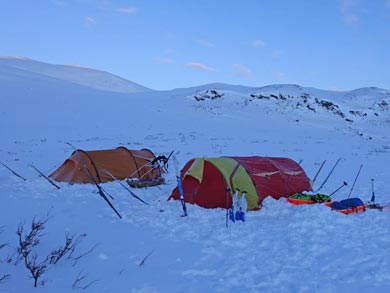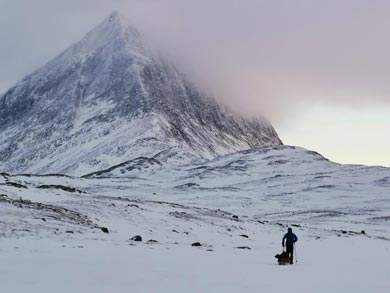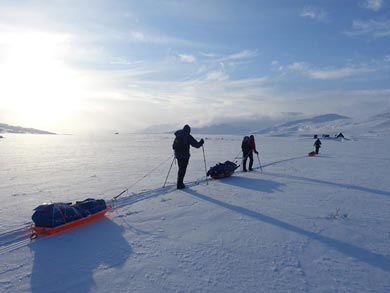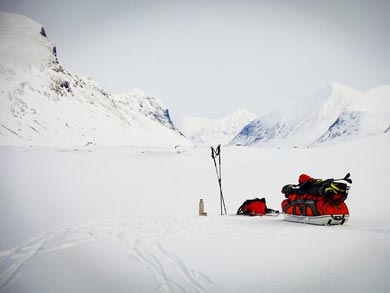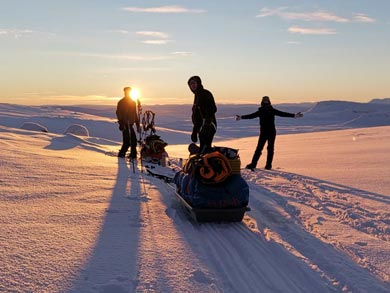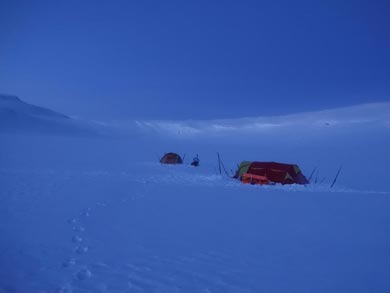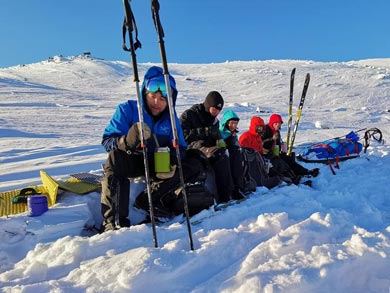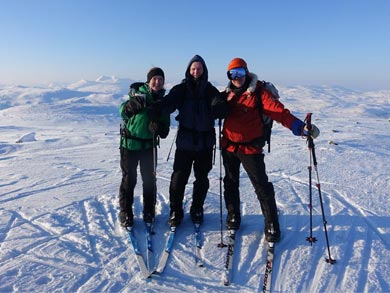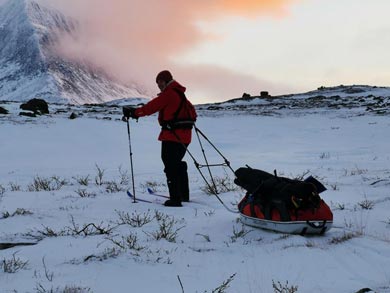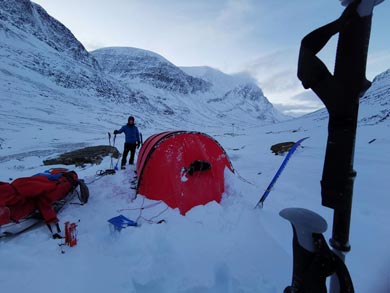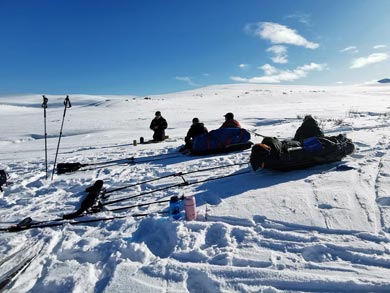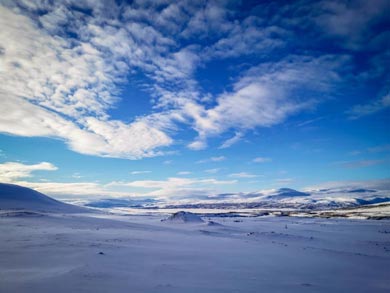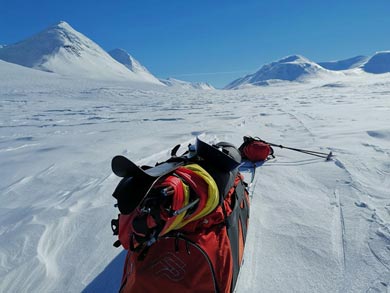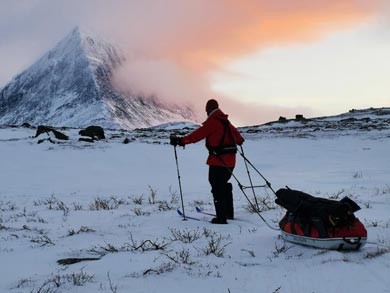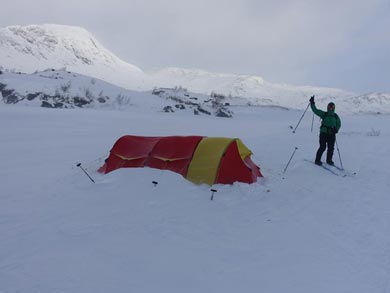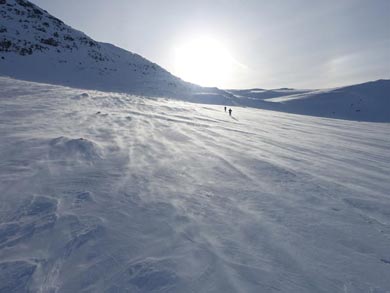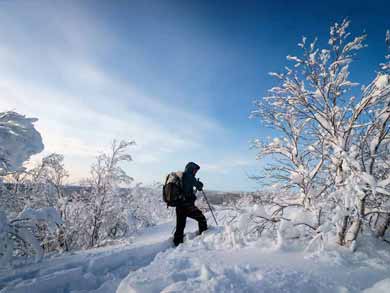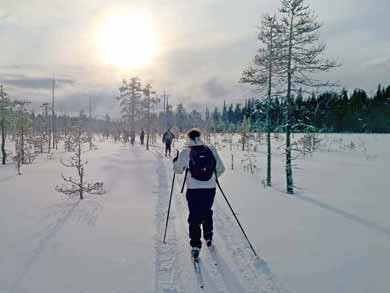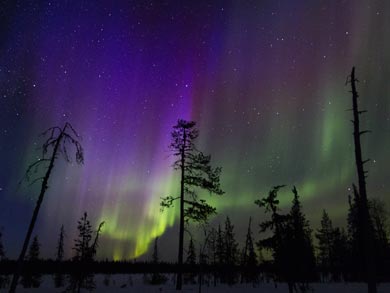Description »
Into the wild
Winter 2026/27: Bookings for this tour are now also open for next winter. We recommend booking immediately if you wish to travel next winter, as availability is typically limited far in advance.
Are you ready for a real Arctic adventure? If you have a high level of fitness, the heart of an explorer, and are used to and enjoy the outdoor life in wintertime, then the wilderness awaits you for a winter expedition you will never forget!
Backcountry Skiing and Winter Camping in Abisko takes you out into the vast fjäll landscape of Swedish Lapland for 6 days/5 nights, with all nights winter camping. Daily distances will typically be around 15km-25km.
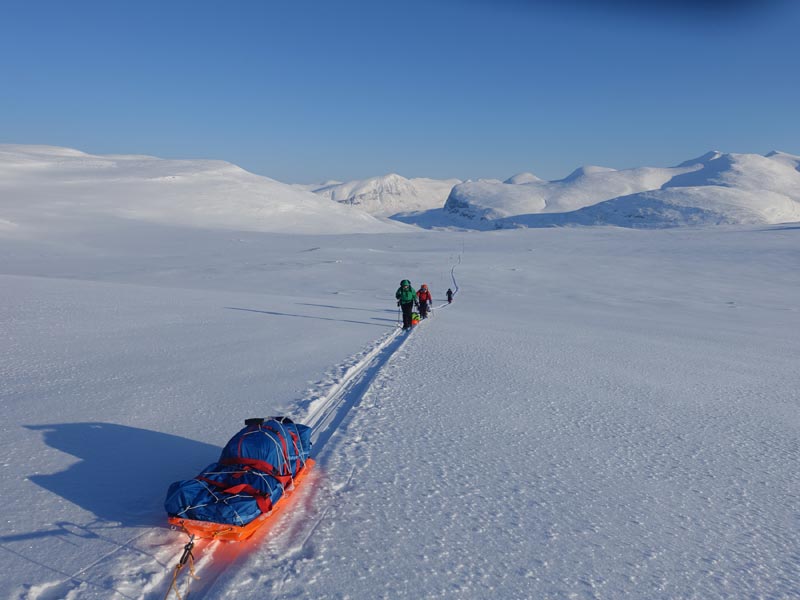
Backcountry skiing gives you unique possibilities to access the wilderness. Photo: Clive Coffey.
The itinerary is not fixed and can be varied depending on weather, snow and temperature conditions as well as the ability of the group. In general, you will aim to do a circular tour, starting directly from Abisko and heading towards Lapporten - a dramatic, shallow U-shaped mountain feature which dominates the landscape from all directions.
From here, you will typically take a clockwise route, predominantly skiing through the valleys, to end in Abisko National Park as you close in towards Abisko Mountain Station once again. There are a number of variations and different valley routes which may be taken to offer the best experience for you.
Overnight independently in Abisko or Kiruna before the tour
The tour begins in the morning of Day 1. You will need to arrive the day before to overnight independently in Abisko, either at Abisko Mountain Station or other accommodation locally in Abisko village. At the end of the tour, you can choose either to depart directly with the late afternoon night train to Stockholm or to spend extra night(s) in Abisko (perhaps you'd like a sauna after all your hard work during the week?) or nearby Kiruna for extra winter activities such as dog sledding before onward travel.
Into the Wild
Once out on the tour, you will be leaving such luxuries far behind, skiing and camping in a very remote area with no permanent human habitation.
Specialist equipment provided
The tour includes full winter equipment, with backcountry skis, boots and poles, high quality tents, winter sleeping bags, sleeping mats and cooking equipment all provided. Pulks for transportation of the main gear are also included. Each person will ski with their own pulk. You need bring only your personal clothing and a few extra items, some snacks, and of course your thirst for adventure and sense of humour!
If you wish to bring some of your own equipment to test (for example if you are in training for another Arctic ski expedition or other trip), you are welcome to do this by arrangement. Please contact us in advance in this case to ensure that your equipment is suitable for the tour.
From the depths of midwinter to the promise of spring
Scheduled tour dates typically take place between February and April, but Backcountry Skiing and Winter Camping in Abisko can be offered throughout the winter season, from December until mid-May. Additional dates can be added on request from min. 2 persons, and private group tours are also possible with tours of longer or shorter duration if required. If you're planning a tour in December and January, you should be prepared for an even greater challenge!
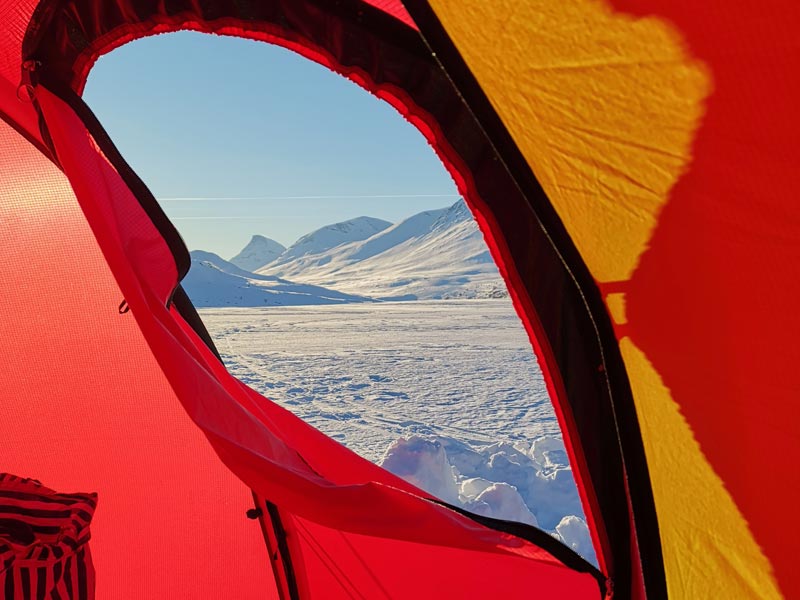
Not a bad view to wake up to from your tent! Photo: WH.
The world to yourself
In general, you are likely to see very few, if any, other persons during your backcountry ski tour, especially for tour dates during the midwinter period between December and February. For tours during the "spring winter" from late February onwards, you may see others in the area, particularly when skiing close to Abisko, but whatever time of the season you choose to travel, this is a very remote area indeed.
The tour takes place above the treeline at all times, and for most of the tour you will be at a height of around 1000m above sea level. There are no prepared ski tracks, so you will be skiing "off the trails". Depending on snow conditions, this can add significantly to the level of physical challenge of the tour.
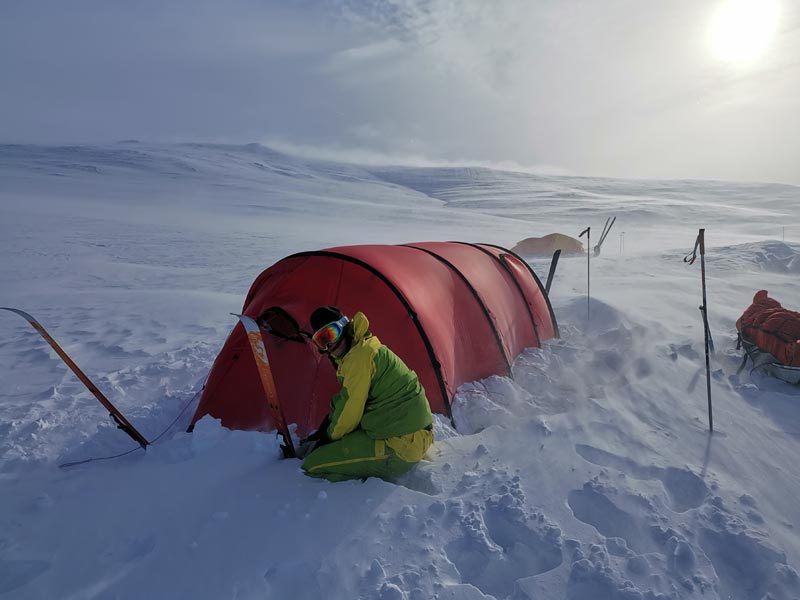
The element of winter camping adds both challenge and adventure to the tour. Photo: WH.
Harness your pulk and get ready for the adventure!
This is backcountry skiing - the winter equivalent of trekking in summertime - and you will be mostly skiing in relatively flat terrain, with some uphill and downhill sections. You will need to carry a lot of gear during the tour, using one pulk per person with your personal items/clothing and a share of communal equipment (tents, sleeping bags, cooking equipment and provisions). Typical pulk weight around 30-35kg.
You should have some previous ski experience for this tour, but backcountry skiing experience is not required (though will be an advantage). You must, however, have a good level of fitness and stamina and be ready for a physically very challenging trip.
The spectacle of the Aurora
For tours anytime up to around early-mid April (after which the nights become too light for the Aurora to be visible), this tour also gives you excellent chances to see the Northern Lights. The Aurora is an inspiring sight to witness at any time, but when experienced in solitude in the middle of a vast wilderness landscape, is something truly magical. You might even be able to watch through the tent flaps from the comforting cocoon of your sleeping bag!
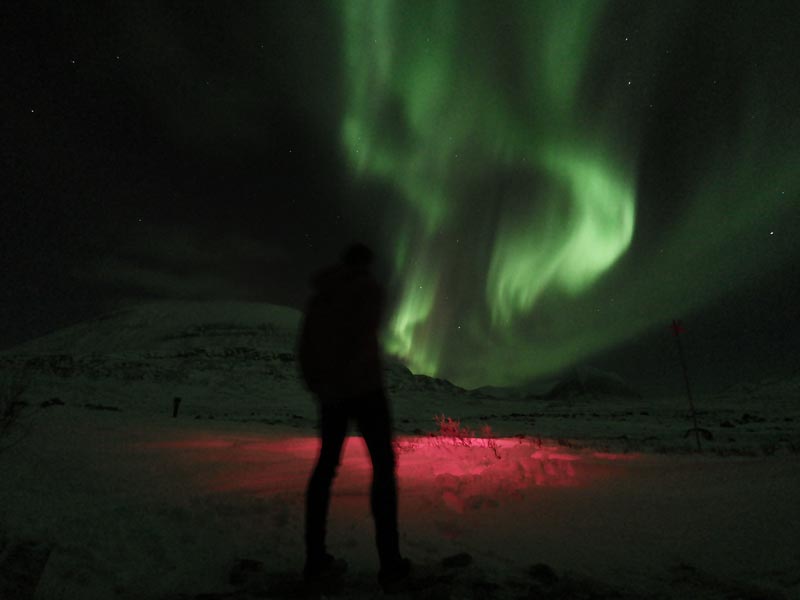
A display of the Northern Lights may bring a magical extra element to your trip. Photo: WH.
The magic of the Arctic wilderness, the excitement of setting off on an expedition, the adventure of winter camping, the satisfaction of challenging yourself and discovering what you can accomplish - all these combine to make Backcountry Skiing and Winter Camping in Abisko a very special way to experience the beauty of Swedish Lapland.
...
Itinerary »
This experience begins from Abisko in the morning of Day 1. You will need to arrive in Abisko the day before to overnight locally before the tour begins, either at Abisko Mountain Station or other accommodation locally.
If travelling by night train from Stockholm or Stockholm Arlanda airport, the train brings you right to Abisko Turiststation or Abisko village. If you are arriving by flight to Kiruna or overnighting in Kiruna before your tour, travel from Kiruna to Abisko Turistation by train or bus (approx. 90 mins).
The area around Abisko has a particular micro-climate which gives a higher than average incidence of clear skies, so this may be an excellent evening to keep watch for Northern Lights!
Day 1 and folllowing: Skiing and Winter camping in the Wilderness!
The tour begins with meeting and preparation in the morning, after which the expedition begins and you head out into the wilderness.
Due to the nature of the tour, the route taken and distances covered each day can be very flexible, depending on weather and snow conditions and the ability and wishes of the group.
In general, you will normally head from Abisko Turiststation towards Lapporten (the "the Lapp Gate") - a dramatic and very prominent feature in the landscape - with the intention to make a circular tour bringing you to Abisko National Park and back to the station on Day 7.
You will plan to spend all nights during your tour under canvas. There is a wilderness cabin in the area which can be used in an emergency, located at the western end of the National Park.
Daily distances will typically be around 15km/day but may be up to 25km in one day.
A guideline typical itinerary for the tour is as follows:
- Day 1: To Cuonjajärvi, distance 15km, height difference +600m.
- Day 2: To Rautasjaure, distance 20km, height difference -300m.
- Day 3: To Bieggaluoppal, distance 21km, height different +450m.
- Day 4: To Bajip Snarapjärvi, distance 21km, height different +500m.
- Day 5: To Gironsnuohki, distance 23km, height difference -350m descent
Day 6: Last Day of Skiing and Tour Ends
Typical distance this day (depending on where you have stayed the previous night) is around 12km, descending on a trail towards Abisko.
Your last ski day brings you back to Abisko. We recommend that you plan to overnight independently in Abisko before departure, either at Abisko Mountain Station or other accommodation locally. Alternatively, depart with the night train to Stockholm leaving around 16.30 or travel with the train as far as Kiruna (approx. 90 mins) to overnight there before onward travel.
Dates & Prices»
Dates 2026
- March: 16.03-21.03.26
Private tours for groups of minimum 2 maximum 6 persons may also be possible on other dates by arrangement between December and mid-May (subject to availability). Note that tours during the midwinter period between December and mid-February may have an even higher than normal level of challenge due to limited daylight and possibly lower temperatures/more challenging weather conditions. For private tours, tours of shorter or longer duration than the standard itinerary can also be offered. Please contact us to discuss your requirements.
The Northern Lights can be seen anytime from around September to early/mid April.
Dates 2027
- February: 14.02-19.02.27
- April: 11.04-16.04.27
Private tours for groups of minimum 2 maximum 6 persons may also be possible on other dates by arrangement between December and mid-May (subject to availability). Note that tours during the midwinter period between December and mid-February may have an even higher than normal level of challenge due to limited daylight and possibly lower temperatures/more challenging weather conditions. For private tours, tours of shorter or longer duration than the standard itinerary can also be offered. Please contact us to discuss your requirements.
The Northern Lights can be seen anytime from around September to early/mid April.
Prices 2026
| Standard Prices | |
|---|---|
| Per person (public tour dates) | GBP |
Prices 2027
| Standard Prices | |
|---|---|
| Per person (public tour dates) | GBP |
What's Included »
Included
Accommodation:
Sleeping accommodation is shared on all nights. Everyone assists with tasks around camp such as preparing food, washing up, etc.
- Five nights' winter camping in shared 2-person tents. There is one wilderness cabin in the area which may be used in the event of an emergency or visited for a day stop during one of the skiing days.
Meals:
- All meals are included from lunch on Day 1 to lunch on Day 6.
- During the tour, the group will cook and eat together. Lunch is taken outside. As dehydrated camping foods are used during the tour and cooking facilities are very simple/shared, common dietary requirements such as vegetarian, vegan, or lactose free, can be accommodated, but opportunities to accommodate more restrictive diets (such as gluten-free, particular allergies) may be limited. Please advise any dietary needs in advance and contact us to discuss your requirements.
Equipment:
- Skis, bindings and poles: Skis used are normally Fischer easy skin Xtralite skis (models with the widest cut and shorter sizes, e.g. 180-190cm). Other skis that may be used include Åsnes Nansens, Madshus Panorama M50 and Voss. All skis use Rottefella NNN BC (not XC) system bindings. Guests wishing to bring own boots and/or ski touring equipment are welcome to do so - please provide details of your equipment in advance to ensure it meets the requirements for the tour.
- Boots: Boots compatible with the skis used for the tours (which have NNN BC bindings) are provided and include Scott, Rossignol BCX2, Alpina BC 1600, Alpina outlander and Lundhags tour. The ski boots serve as the main boots for the tour - no additional winter boots are required. Overboots are also included for additional warmth/snow protection. If bringing your own boots but using the skis provided, boots must be compatible with NNN BC bindings.
- Camping equipment: Winter sleeping bag with liner and closed cell sleeping mat; high quality tents.
- Pulk: Each person will ski with their own pulk, carrying a mix of communal and personal equipment.
- Cooking equipment.
- Camping plate/bowl, mug and cutlery.
- Toilet paper.
Guide:
Experienced and knowledgeable local guide.
Not Included
- Travel: We do not arrange flights or domestic travel, but are happy to advise on suitable connections and assist you with any aspect of planning your journey. See under "Getting There" for general travel information.
- Accommodation in Abisko before/after the tour (required for night before the tour, optional for night after).
- Alcoholic drinks.
Good To Know »
Required
Health requirements/experience:
Compared to the closest alternative (the Halti itinerary for Backcountry Skiing and Northern Lights in Finnish Lapland), the level of physical and mental challenge for this tour is around 50% higher. The level of downhill skiing required is also significantly higher. It is very important that you are confident that you fully meet the requirements for this tour - see "Is this experience suitable for me?" below.
This is a very challenging experience requiring a very high level of fitness and stamina. Minimum age 18 years. You must be used to the outdoors and wild camping and be prepared for travelling in a remote area. Previous experience of downhill and cross country skiing is required, but as the skiing is not technical, previous experience of backcountry skiing/touring is an advantage but is not essential for the tour.
You will be skiing with a pulk carrying all personal and a share of communal equipment. Any items not needed can be left behind at the start point. Pulk weight is typically around 30-35kg.
There will be no prepared tracks (except normally at the start and end of the tour when you are close to Abisko), and especially if the snow is deep and soft, breaking the trails can be very challenging. The addition of winter camping to the tour also significantly increases the level of physical challenge - preparing and breaking camp requires significant time and energy, and of course there is normally no opportunity to make fire for camping nights as there would be when staying in cabins. The intention is to camp on four out of the five nights you are out during the tour.
Tours during the deep midwinter period in December and January may be particularly challenging due to the limited daylight and possibly lower/more challenging weather conditions during this time. For tours throughout the winter season, you should bear in mind that this is a mountain region and weather and temperature conditions can change quickly at any time.
Tours from late March to mid-May, during the "spring winter", will have much longer hours of daylight and typically milder temperatures.
The daily itinerary and distance covered each day is variable, but you should be comfortable skiing daily distances of up to 25km (typically distance covered is more usually around 15km/day) in challenging terrain with no trails. Daily skiing time typically around 6-8 hours per day including lunch break and shorter stops.
Is this experience suitable for me?
Expectations for participants for this experience are:
- You should be able to run at jogging speed (10km/h) for 15-20km.
- You should be able to hike with a 20kg rucksack for 20km/day.
- You must have previous experience of downhill and cross country skiing.
- You must have previous experience of 3-season wild camping.
- Experience of the following is preferred but not essential: backcountry skiing, pulling a pulk, wild winter camping in snow.
What makes this "Hard +"?
These tours take place in very remote wilderness areas with most nights winter camping. There is likely to be no mobile phone coverage for the majority of the tour (your guide will carry a satellite communicator in case of emergency).
You will be skiing with a pack and/or pulling a pulk (shared with other participants) and there are no prepared ski tracks - in general, you will be skiing "off the trails" throughout the tour. Skiing on unprepared terrain is much more physically demanding than skiing on tracks.
When trail breaking is required, participants will take it in turns to go at the front.
The tour takes place at all times above the treeline in very exposed terrain, where weather conditions encountered can make the tour very challenging.
NB: Perception of difficulty is very subjective. What is hard to one person may be easy for another and vice versa, depending on factors including level of fitness, age and previous experience. Weather conditions/temperatures can also dramatically affect the actual level of challenge encountered.
Equipment/clothes needed:
For information on any equipment and/or clothing included as standard for this experience, please see under "What's Included".
A detailed recommended packing list for personal items to bring will be sent with your booking documentation.
NB: We advise you not to buy equipment or clothes for your trip or to incur other non-refundable expenses such as flights until you have received confirmation of your booking from us in writing. Note of course that the most appropriate clothing to use as well as the level of challenge experienced during any outdoor activity may vary significantly depending on factors such as the time of year and the particular weather/temperature conditions during your trip.
Preparing for your trip:
For further reading, we also have a number of general information articles to get you ready for your trip, covering a wide variety of topics from what to do on a city break before/after your tour, advice on packing, eyewear for winter and considerations for female travellers.
Minimum number:
- Winter 2026: Scheduled tour dates require total minimum 2 persons to be guaranteed to run (you are of course welcome to book as a solo traveller). Private tours on other dates are possible by request for minimum 2 persons, subject to availability.
- Winter 2027: No minimum required. Tours are guaranteed to run from the first booking.
Groups
Max. group size 6 participants for scheduled tours. For private tours, it may be possible to accommodate groups of more than 6 persons - please contact us to discuss your requirements.
Eco Info
This provider has a written environmental policy.
Getting There »
Getting There
See below for a summary of travel options. To learn more about how to travel to this experience, please get in touch!
Detailed information on travel will be provided in response to your enquiry. We are happy to advise on suitable connections and assist you with any aspect of planning your journey.
NB: Please ensure that you make a booking with us first and wait for confirmation that your spaces are reserved before making any travel arrangements.
Travel Summary:
By Air:
Fly to Stockholm then onward to Abisko Turistation by night train or to Kiruna by night train or domestic flight connection. Transfer from Kiruna airport or town is included in connection with arrival/departure for the tour.
Without Flying:
Ferry Dover-Dunkirk or Newcastle-Amsterdam for onward train connections to Abisko Turiststation.
Where Is It...?
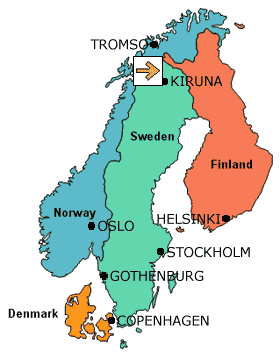
Reviews »
You can also see customer photos from this experience in the Nature Travels Facebook Gallery.
Customer Reviews:
"It gave me the chance to enjoy a unique experience and marvel at great scenery. I learned a lot and it has certainly helped me appreciate the rigours experienced by those who travel in the Arctic. A new respect. I cannot recommend the guide highly enough. Invariably happy, very professional with a huge amount of experience." Peter
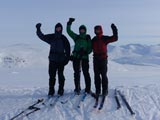
"Everything pre-departure was excellent: the amount of info about the trip, the ease of contact for further details, the email communications, the flexibility to work with our personal requirements. The highlights were numerous: the location and landscape, the weather we enjoyed, the easy relationship we quickly established with the guide, and the skills we learnt, especially the campcraft in the low temperatures. In 30 yrs of going to Scotland in the winter and the Alps in the summer, this is the first time we have actually hired a guide, and it proved to be a very good experience. Thank you for making it happen!" Clive, private tour

